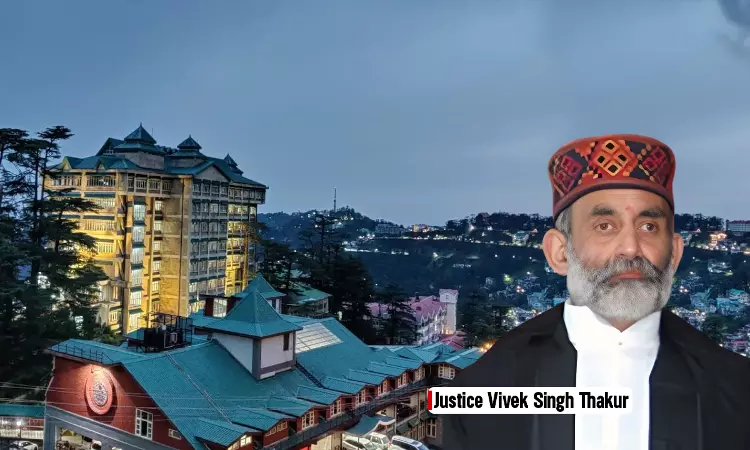- Home
- /
- High Courts
- /
- Himachal Pradesh High Court
- /
- MNREGA Workers are Not Employees...
MNREGA Workers are Not Employees Under Employees' Compensation Act: Himachal Pradesh High Court
Mehak Aggarwal
5 May 2025 6:33 PM IST
The Himachal Pradesh High Court dismissed a petition, holding that in cases involving the death of worker employed under the Mahatma Gandhi National Rural Employment Guarantee Act (“MNREGA”), 2005, compensation cannot be claimed under Employees' Compensation Act. The court determined that such workers do not fall under the definition of “employee” under Section 2(dd) of the...
The Himachal Pradesh High Court dismissed a petition, holding that in cases involving the death of worker employed under the Mahatma Gandhi National Rural Employment Guarantee Act (“MNREGA”), 2005, compensation cannot be claimed under Employees' Compensation Act. The court determined that such workers do not fall under the definition of “employee” under Section 2(dd) of the Employee's Compensation Act, 1923.
Justice Vivek Singh Thakur held: Once it is clear that MNREGA worker is not covered under the definition of Employee's Compensation Act, there is no right to claim compensation under the said Act for death of a person employed under MNREGA/Scheme, even if the death occurred during course of employment.
Background facts:
Ramesh Chand had been engaged as a worker under the MNREGA scheme. However, on 7th February 2009, a large rock fell on his chest during work, resulting in his immediate death.
Subsequently, his family filed a petition before the Deputy Commissioner, Shimla seeking compensation under the Employee's Compensation Act for the loss suffered.
In response, the respondents submitted that the deceased did not fall under the purview of Employee's Compensation Act, as he had not been directly employed by the employer. Also, there was no contract of service and any control by the employer over the worker.
They further argued that MNREGA is a welfare scheme that provides temporary employment to households in need. So, there is no structured employment agreement and the workers take up the work voluntarily for a specific time frame.
Based on the submissions, the Deputy Commissioner held that the deceased was not an employee as per the Employee's Compensation Act and was therefore not entitled for compensation. A sum of Rs.25,000 had already been provided to the family by the Government of India and they were not entitled for any other compensation.
Aggrieved by the commissioner's decision, the claimants approached the High Court seeking rejection of the order passed by the Deputy Commissioner and sought compensation under the Employee's Compensation Act.
Contentions before the High Court:
The claimants submitted that the Government of India had launched the e-Shram portal on August 26, 2021, to register unorganized workers. It provides financial support in cases of “sudden, unforeseen and involuntary event caused by external, violent and visible means”.
Unorganized workers are a group who often lack formal employer-employee relationships, and are involved for work in agriculture, construction, domestic work, street vending, and other informal sectors.
The claimants further contended that since the deceased was an unorganized worker and had died during the course of work, he should be entitled to financial support under the e-Shram scheme.
Per Contra, the respondent submitted that only those unorganized workers were eligible for claim who were registered on e-Shram portal on or before 31st March, 2022. Since, the deceased had not been registered, he did not qualify for benefits under the scheme.
The respondent further submitted that the deceased was not workman/employee as per the Employee's Compensation Act and was employed through MNREGA. He was entitled for a compensation by the Government of India, which has already been granted.
Findings:
The High Court observed that the MNREGA scheme was enacted to enhance livelihood security in rural areas by guaranteeing 100 days of wage employment every year to members of the household who volunteer to do unskilled manual work.
Clause 3 of the National Rural Employment Guarantee Scheme, 2006, clarifies that employment is provided to the entire household and all adult members can volunteer for the work. Therefore, it is not an employment to a particular person but is a scheme to provide work for 100 days in a financial year to the household.
Further, as per Section 2(dd) of the Employee's Compensation Act, an employee is someone who is employed directly by an employer on permanent basis with a formal work contract. Since the deceased had voluntarily taken up work under the MNREGA scheme for just 100 days, he could not be considered as an employee.
As for the e-Shram Scheme, the court held that since the deceased was not registered on the portal prior to his death, the benefits could not be granted retrospectively.
Accordingly, the court dismissed the appeal, ruling that the deceased's wife had already received a grant of Rs.25,000/- from the Government of India and was not entitled to any additional compensation.
Case Name: Geeta Devi and Others
Case No.: FAO No. 07 of 2014
Date of Decision: 01.05.2025
For the Appellant: Mr. Balbir Singh Chauhan, Sr. Advocate with Mr. Abhishek Thakur, Advocate.
For the Respondents: Ms. Seema Sharma, Deputy Advocate General.



